Dr Joei Potter Interview: Anaesthesia Specialist University Of Dublin
Dr Joei Potter works as a veterinary anaesthesia and pain specialist at the University of Dublin.
Having graduated from Murdoch University in Australia, Dr Joei shares her story about why she chose to specialise in anaesthesia and the struggles she has seen in this profession.
The Road To Becoming An Anaesthesia Specialist

Dr Joei Potter BSc BVMS BMus MANZCVS Dip ECVAA VCI
I am one of those infuriating people who knew what she wanted to be from a very young age.
My dad shares a story that I wrote at age 8 about how I wanted to be a vet and how I would achieve this. The rest, as they say, is history.
My childhood was spent in Saudi Arabia, with cats, guinea pigs, rabbits and tortoises as pets. When we moved to Australia we couldn’t bring these with us and we gave them to friends.
Once in Australia, I was told that we could get a dog and then if I looked after that well enough, a horse.
Three dogs and four horses later, I managed to sit the TEE exams (as they were then called). I didn’t quite get the grade needed to go to vet school.
Unperturbed, I applied to Murdoch. Instead, I started in biomedical science but made sure that the tutors knew that I would like to transfer into vet if possible.
During the first week at uni, I was looking for my name on a class list for laboratory exercises and I wasn’t on the biomedical list, I was on the veterinary list.
I went to see the lecturer, thinking there was a mistake, but it turned out that some students had declined their place at vet school and I had been moved into the class.
A bit of a backdoor way of entering vet school, but I’m very pleased it happened. My dad says if I fall out of bed the mattress tends to land first!
Challenges In My First Job
I had a great time at uni and after graduating went into mixed practice in the country south of Perth.
Here I learned all sorts of useful things:
- exactly how useful gaffa tape can be,
- how strong you need to be to pull a calf,
- it ain’t over til it’s over when treating uterine prolapse in cattle,
- and how to bend a gate around fence post to make a sling for a cow that had likely been bitten by a snake and was down.
I also lost the first cat castrate I ever attempted solo due to anaesthetic complications.
My friend Christina (who graduated in the same year as me) was the most supportive angel at this time and the boss really… wasn’t.
We had a receptionist that used to dispense incorrect advice down the phone without checking with the vets and if she was on her lunch break she wouldn’t answer the phone at all, and the nurses would hold a phone to your ear while you were elbow deep in a dog spay.
It was a very challenging job, and I learnt a lot about what I could cope with as a human.
There was one particularly challenging day I remember.
It was a day where I lost a mare and foal.
I arrived at the property and started to pull the foal out, but the mare’s intestines came too. Later I performed a post-mortem to see what had happened there was a hole in the ventral aspect of her uterus, an abdomen full of blood and her small intestine was pulled through the uterus and into the pelvic canal.
My day didn’t stop then, I returned to the clinic where there was still a fat bitch spay left to do.
I opened the surgical kit to start the spay and there were only two clamps. I asked for another kit and was told it’s not fair to open another kit because then there is more cleaning to be done afterwards.
I lost my temper and said it’s called a three-clamp technique for a reason.
This episode earned me the privilege of the nurse not talking to me again.
This happened in September. I elected to resign in December.
Emergency Work And Back To Study
My next job was in the city working at an emergency clinic. I loved this job, but learned quickly that a lot of the ‘make do’ country attitude doesn’t fly in the city and a lot of the previous-generation ideas had actually moved on.
It was a steep learning curve and I was doing a lot of nights – which was brilliant – you are on your own, you have someone on the end of the phone but you are expected to do the necessary research and make decisions on your own.
I loved the thrill of it, trying to coax animals back to life that had been in a pretty bad way (hit by car, snake bite, heat stroke, congestive heart failure decompensation – the usual stuff).
I also decided that I missed having some sort of artistic balance in my life. So continued to work nights only and went back to uni during the day to do a degree in music.
I also discovered that Murdoch was looking for more night staff for their emergency department, I applied and was offered the job.
I had a ball working at Murdoch. Being around people who were actively involved in continuing their own education and assisting you with your own study was wonderful.
I loved having the variety of brains available to question and learn from and who gently told me when I was doing something stupid, wrong or ways in which my practice could be improved.
I made some pretty catastrophic mistakes. But was always supported by the team.
I discovered I really loved teaching as well as anaesthesia and critical care so when a position came up in the anaesthesia team I applied and got it. Thus began my journey to specialisation in anaesthesia.
The Road To Vet Anaesthesia Specialist
I was taken under the wing of a wonderful anaesthetist, Dr. Peter Gray (who very sadly passed away recently) and I learned the basics of a very involved, very challenging discipline.
I knew I wasn’t cut out for general practice – I knew that I always wanted to understand more and I realised that my brain is not big enough to know everything there is to know, so I focused on one area.
The one area that hit me the hardest as a new graduate – losing my first cat castrate to an anaesthetic complication.
I also knew that in the human medical sphere anaesthesia is performed by specialists and the idea of being responsible for keeping the patient alive is not to be sniffed at.
I also loved the pharmacology and the physics of the discipline and was excited to further my training.
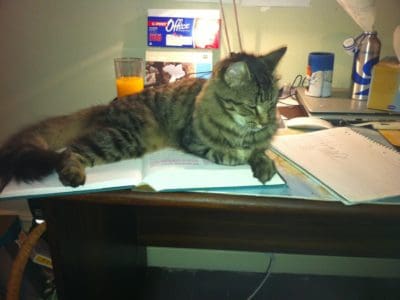
Trying to study when the cat has other ideas.
I had also been on the receiving end of some pretty appalling treatment by owners. I was told repeatedly that ‘don’t you love animals? If you loved animals you would treat my pet for free!’ and one particularly memorable person told me they would wait for me in the carpark to ‘do me in’ because I refused to fix the broken wing of a stray magpie.
I was also told I was going ‘to go hell with the devil on my back’ because I charged a guy for unblocking his cat’s bladder. He then said he would do it with a pen if it happened again.
I never wanted to be treated like that again. I never wanted to be called names for doing my level best to save an animal.
I applied for a residency in the UK and got it. I then arrived in the UK with two suitcases to build a new life.
The anaesthesia residency at Bristol Unversity was bloody hard work. As it should be. But I loved it. I love the fact that working in a referral hospital meant that by the time the owner brought their pet to you they were ready and willing to spend the money.
I had fantastic support from all the senior clinicians and I learned so much.
My cohort of residents were a great bunch of people and Bristol is a fantastic place.
However, during my time in the UK I learned that three of my close friends in the veterinary industry had committed suicide. In honesty, I can see how it happens.
I met my husband in England in 2012 and at the end of my residency, we had our first child.
I then had the daunting task of the diploma exams. Three four hour written papers and then four practical/viva assessments. I passed the written exam the first year (2015), but had to re-sit the viva, and in 2016 I finally became a specialist.
I loved working in Bristol, but my husband’s job has brought him to Ireland, so naturally, I had to move.
I now work at the teaching hospital in Dublin, I have started in the ICU but will be moving to the anaesthesia team in January.
It is a fantastic place to work, the Irish are much like the Aussies and have a great sense of humour. The only problem is the weather is a little cold….
A Typical Day As A Veterinary Anaesthesia Specialist
My typical day now begins with receiving any overnight emergency transfers in the morning and then managing the intensive care unit during the day.
The variety of cases is huge, but not dissimilar to the other referral hospitals in which I’ve worked.
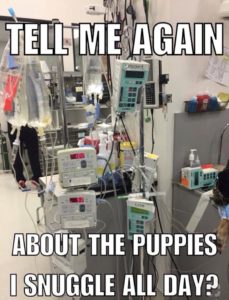
Intensive care and pain management.
At the moment we have in the clinic:
- a dog with colchicine toxicity,
- a dog with seizures after cytarabine therapy for meningitis of unknown origin who had been anaesthetised overnight,
- a dog with a pericardial effusion and runs of multiform ventricular tachycardia and
- a dog that is likely to be ventilated soon due to nasty septic shock post radical mastectomy surgery for mammary cancer.
I am still trying to do research and maintain publications but that requires time off clinics to get the necessary paperwork done.
It will probably happen before the end of the year.
I am not currently studying, but I am needing to find the next ‘project’ and it may well be going back to uni and doing human medicine.
This isn’t because I don’t love my job – I absolutely do, being a vet is what I have wanted to do since I was a kid. To be an advocate for those who don’t have a voice.
I consider myself very lucky that I wake up in the morning and look forward to going to work.
But it’s because I’ve reached as high as I can get to financially within my chosen field. And sadly, were it not for my husband, I wouldn’t be able to afford to buy a house on my current salary.
I think this is a very sad indictment of veterinary medicine. But if I’m going to build a secure future for my family then I need to look at how to possibly improve my income.
Times I Feel Most Proud
Funnily enough, the moments of which I am most proud have nothing to do with my clinical abilities and everything to do with my students. I really enjoy watching students excel and watching them make the decision to further their career.
What I Wish More People Would Understand About Animal Care
I wish that people would recognise that animal ownership is a luxury and not a right, and they owe it to the soul of their animal to do their best to look after them.
It is NOT ok to cry over the body of your pet that you vehemently say you can’t afford to treat and then go outside and smoke a pack of cigarettes and jump into the latest model car.
This says a lot about your priorities as a person.
It is also NOT ok to accuse the vet of being money-grabbing simply because they are doing their job.
You don’t say the same to your mechanic or your dentist or your plumber when they ask and expect a financial return for their skill and services.
We are at a stage now in veterinary medicine where we can and SHOULD offer gold standard care and human-standard care to our patients. It is no longer ok to cut corners, especially in higher income countries.
My Favourite Animal
I love horses.
They are beautiful animals who are loyal and loving to own and they are a significant challenge from an anaesthesia perspective. I love the challenge.
New Products Or Technology That Gets Me Excited
I am very much looking forward to the day when we can provide intensive care in animals in the same way that it’s done in humans.
I am always delighted when we are able to inherit from the human research something that can be used in our patients, be it a fancy anaesthesia machine or a ventilator or a new diagnostic modality.
My current favourite is EEG and I hope this will soon be part of my everyday work.
How I Think We Can Improve Veterinary Medicine
I am trying, one person at a time, to make people aware that for veterinary medicine to fall into place with the leaps and bounds that have been made in human medicine, we must build bigger practices.
Gone are the days of having a profitable vet clinic on every street corner.
We need the economies of scale to provide specialists, general practitioners and all the tools in between, to all of our patients all of the time.
Veterinarians need to work together as a community and expect a higher standard of ourselves and the care we provide to our patients.
No veterinarian graduated with the aim of cost-cutting and having a ‘she’ll be right mate’ attitude to medicine and surgery.
None of us graduated thinking that analgesia was an optional extra that the owner could tick on the admit form.
Our abilities are so far beyond this that we must embrace it as a community. Work together for what will ultimately be the greater good of our patients.
We should be less worried about the guy down the road undercutting our costs and instead work together to provide a more stable income for both practices and a more solid clientele base.
We need to have regulations put in place to ensure adequate standards of care in the same way they do in the human medical sphere.
We need to know what our skills are worth and charge appropriately and we need to be supported by our associations such as the AVA to put this into regulation and legislation where necessary.
My own personal soapbox is that anaesthesia and pain management can be improved.
Our understanding of medicine is so much more than many of us currently practice as vets due to client restraints.
I would love to see more vets being allowed to practice gold standard, evidence-based medicine with better outcomes for our patients.
Thanks so much Dr Potter for sharing your story! I’m sure everyone can agree that it’s tough out there as a vet and we do get to see both tragedies and good times.

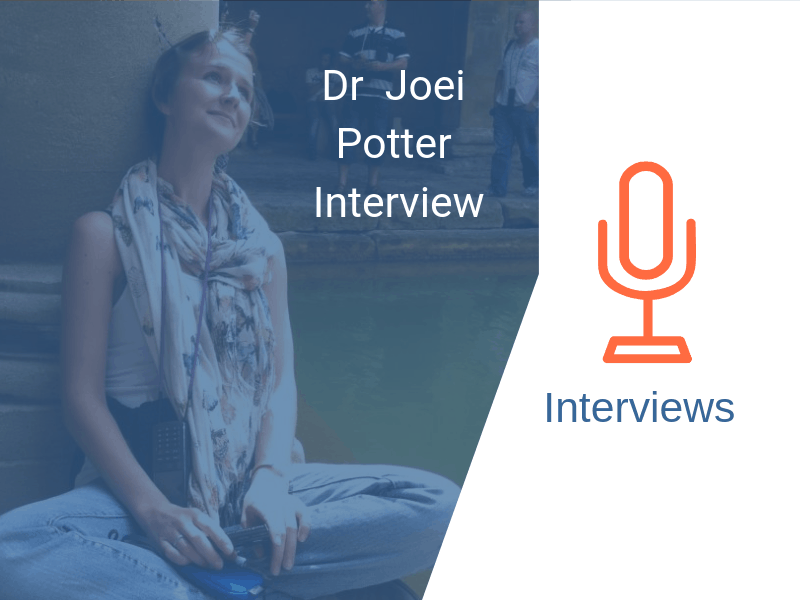
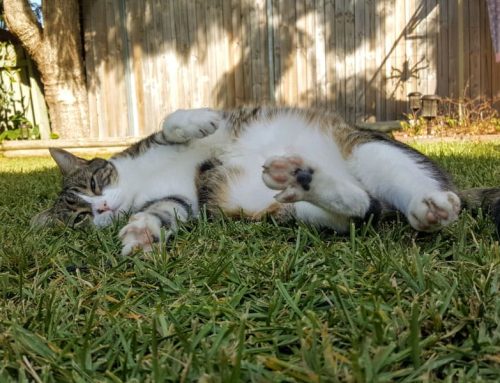
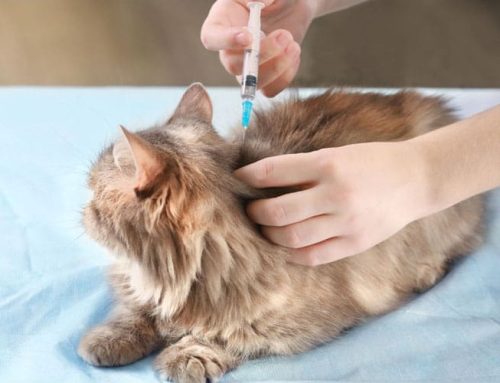
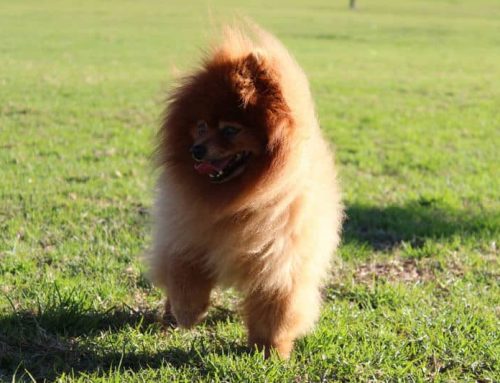
Leave A Comment